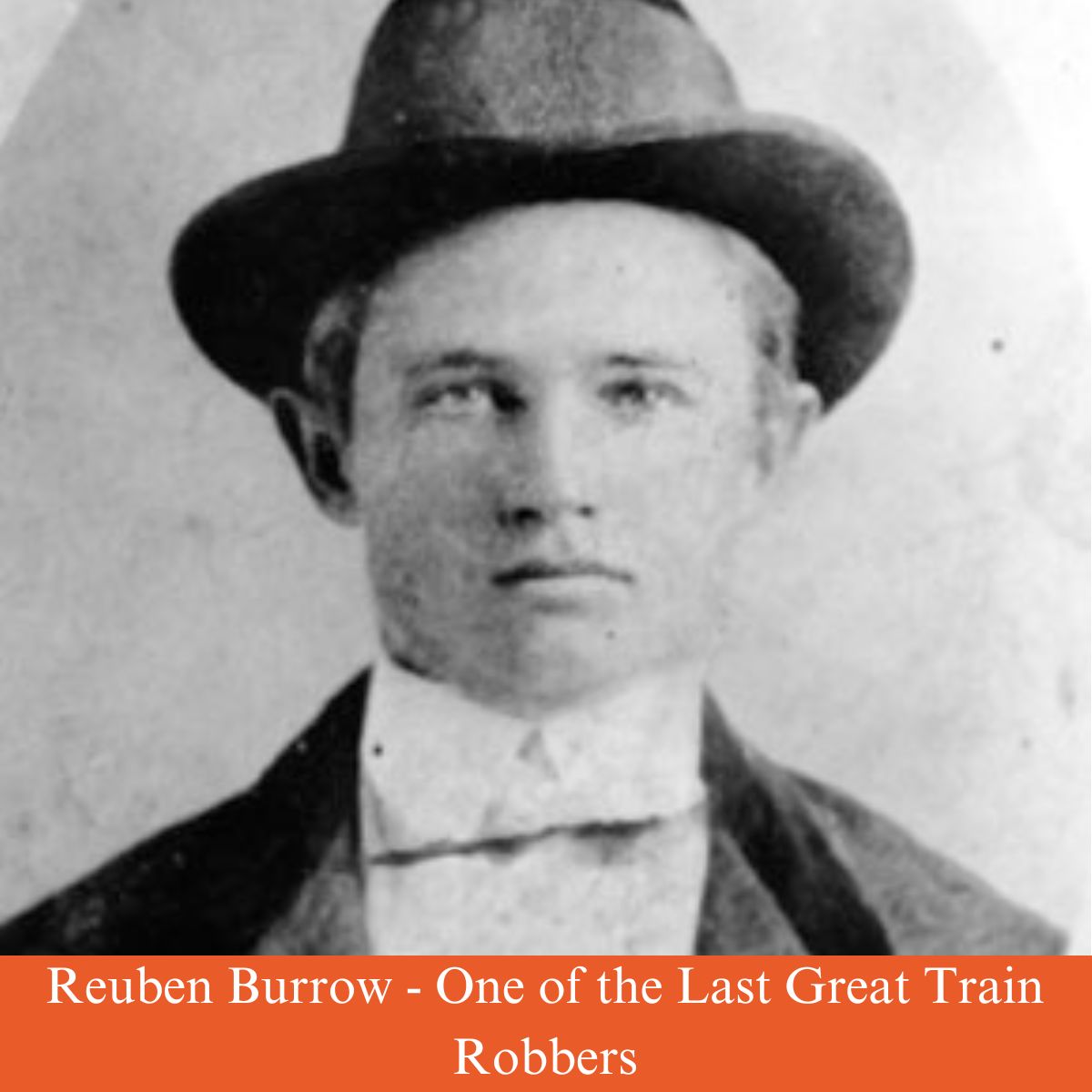Reuben Burrow was one of the last infamous train robbers and gunslinger of the Wild West. He robbed trains in at least four states and within Indian territory. He was extremely elusive to the authorities and would eventually be hunted by the Pinkerton National Detective Agency.

Jump to:
Early Life
Reuben Burrow was born in Lamar County, Alabama, on a family farm. There does not seem to be anything out of the ordinary with his life during his childhood and teenage years. He worked on the farm and, at the age of 18, moved to Stephenville, Texas, where he worked on his uncle's ranch.
Burrow seemed to enjoy ranching and planned on owning his own ranch. He married and had two young children. However, his first wife died of yellow fever and left him to care for his two young children.
He remarried and moved to Alexander, Texas, still with the dream of running his own ranch, but his crops failed and left him very little options to pay his debts. In response, he turned to his brother Jim Burrow, who had some success in robbing trains.
On December 11, 1886, he and his brother worked with W.L. Brock, Leonard Brock, Henderson Brumley, and Nep Thornton to rob the Denver and Fort Worth Express. The take was meager as they managed to steal around $300, but nobody was caught or hurt in the robbery. Shortly after this small success, Burrow began planning another robbery.
Rising Notoriety
Reuben Burrow learned his lesson from the first job and would be much more successful on the second job.
This time, the gang boarded a train heading to Benbrook, Texas. Burrow met up with the engineer, held him up at gunpoint, and had him stop the train in an advantageous spot for a robbery. They were able to take their time and locate more loot than the previous job. Burrow would rob another train in the same spot a few months later.
The loot they were able to take off with is estimated to be between $12,500 - $30,000.
On December 9, 1887, he and Jim Brock stopped the St. Louis, Arkansas & Texas Railroad express train at Genoa, Arkansas. Despite the train being guarded by the Southern Express Company, the two men escaped with a Louisiana lottery payoff estimated to be between $10,000 and $40,000.
Because the Southern Express Company was a client of the Pinkerton Detective Agency, the robbery came to the attention of Pinkerton detectives, lawmen, and bounty hunters alike. Within five days, Pinkerton men came up with their first major lead. A deputy sheriff had reported that he had encountered three suspicious-looking men on the day of the robbery.
All three escaped. However, one of the men left behind a raincoat, which was eventually traced to a store in Dublin, Texas. The sales clerk identified the man who bought the coat as Jim Brock. Once in custody, Brock quickly confessed to participating in the robbery and named Burrow as the ringleader.
Reuben was known to the authorities as he did not have a criminal record, and they did not know his whereabouts. However, fortune turned their way when Reuben sent a letter to Jim Brock, and on it was listed his home address. Authorities rode to the homestead and surrounded it, but Reuben Burrow had learned of their coming from his brother and had already left.
Two weeks after making their escape, Rube and Jim Burrow were spotted by a conductor while riding on a Louisville & Nashville train in southern Alabama. Police surrounded the train when it arrived in Montgomery, Tennessee, and a gunfight broke out between the brothers and the authorities.
Jim Burrow was captured, but Rube managed to escape alone. Jim would die soon after of tuberculosis.
Death
Although Burrow was usually a cautious and detailed planner, he began to develop a reckless attitude, which was further encouraged by his recent series of near escapes. Shortly after the gunfight at Montgomery, Burrows shot and killed Lamar County Postmaster Mose Graves in July 1889 during a heated argument when Graves demanded that Burrows sign for delivery of a package.
The uncharacteristically cold-blooded murder of the postmaster turned the local residents against him and forced him to flee the county. Ironically, the package had contained a false beard Burrow had ordered to disguise himself.
Burrow continued to rob trains despite being a wanted fugitive. In September of that year, he robbed the Mobile & Ohio Express train near Buckatunna, Mississippi, and then the Northwestern Railroad train in Louisiana two months later. He was pursued by Pinkerton detectives following the robbery for two days across the Raccoon Mountains in Blount County, Alabama. The posse was forced to turn back after two trackers had been killed and three others seriously wounded.
Burrow would become infamous as the nation followed the manhunt from the authorities to find him. Despite the publicity and the fame, Burrow managed to stay out of their grasp for two years.
It came to an end when Burrow was captured by two black men and two white planters. He would be caught and thrown in prison.
In the early morning hours of December 8, 1890, Burrow complained of hunger and talked his jailers into handing him his bag, which had some ginger snaps inside. It also contained a gun, and Burrow held it at the head of one of the guards. He escaped, locking two guards in his cell and taking another guard with him to find Carter at Glass's store to get back the money that had been taken from him. Burrow reportedly believed Dixie Carter was Nick Carter, the fictional detective. Carter was in the store, and when he came outside, he and Burrow exchanged gunfire.
After the smoke lifted, Reuben Burrow was laying in the street dead.
His body was sent back to his father, who arranged for the burial.
